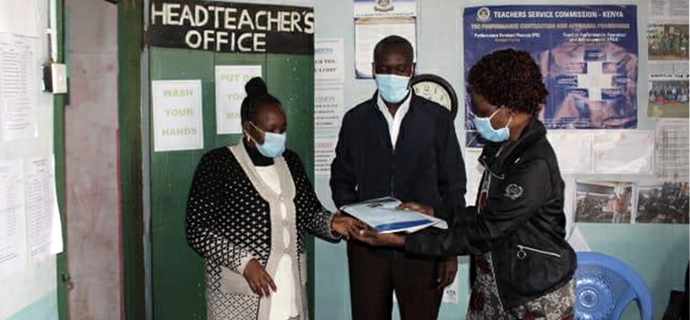
COVID-19 disrupted the learning of many children globally, denying them access to social protection and other benefits associated with schooling.
In Kenya, the Ministry of Education—in collaboration with UNESCO, UNFPA, the Population Council, and the Sexual Reproductive Health and Rights Alliance—developed the National Guidelines for School Re-entry in Basic Education through a participatory process.
Many girls experienced elevated risks—such as child marriage, early pregnancy, and violence—which hindered their ability to return to school after long school closures in Kenya.
In an effort to promote school re-entry for pregnant/parenting girls, Kenya’s Ministry of Education implemented a back-to-school campaign: the Track, Trace, Talk, and reTurn (4Ts) initiative. The Population Council provided technical support. The initiative was implemented in Homa Bay and Narok counties from May to August 2021.
4Ts operationalized the school re-entry policy guidelines by tracking down and tracing out-of-school girls at the primary school level; talking to girls and their families about the guidelines to inform them of girls’ right to return to school; and ensuring that girls who wanted to, did return to school. 4Ts reached 1,424 out-of-school girls.
A monitoring tool captured details of out-of-school girls reached, including information on location, age, and the main reason for being out of school (i.e., pregnant/parenting, lack of childcare, marriage, sickness or taking care of a sick parent, and lack of school fees).
The monitoring data showed that COVID-19 exacerbated some of the pre-existing challenges that disrupt girls’ access to education. A vast majority of girls (over 82%) dropped out of school because of a pregnancy or child marriage deemed to have happened in the COVID-19 pandemic period.
Data show that 4Ts enhanced access to education. About 30% re-entered school and another 54% were planning to re-enter during the intervention period.
Most girls (83%) were pregnant or parenting. Most parents were willing to support school re-entry for daughters by taking care of the baby, reducing domestic chores to create study time, providing financial support, and being role models.
4Ts was a structured way of implementing Kenya’s school re-entry policy for the benefit of pregnant/parenting learners. Nonetheless, harmful cultural practices, such as child marriage and pregnancy-related taboos, hindered school re-entry for girls. Eighty-eight percent of girls in Homa Bay and 81% of girls in Narok were not planning to return to school.
Long-term solutions to addressing the negative impacts of the COVID-19 on access to education for girls who are marginalized can benefit from harnessing nationally led initiatives and parental involvement.
Learn more: 4Ts Initiative Implementation Report | Lessons from the 4Ts Initiative
